What is artificial intelligence and what impact does it have on the job market?
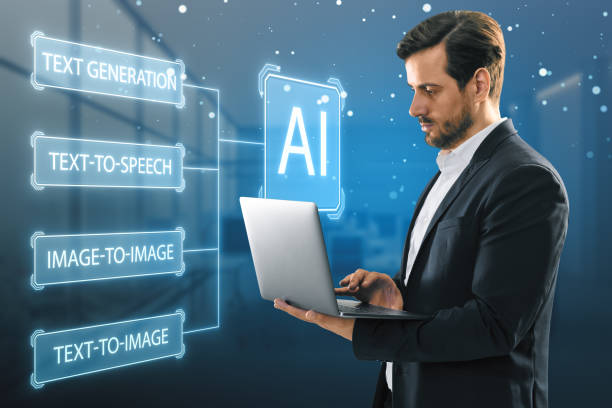
What is artificial intelligence and what impact does it have on the job market?
#Artificial_Intelligence (AI) refers to the ability of a computer system to perform tasks that usually require human intelligence.
These tasks include learning, reasoning, problem-solving, understanding natural language, and pattern recognition.
Artificial intelligence is rapidly advancing and has profound effects on the global job market.
The impact of artificial intelligence on the job market is twofold: on the one hand, some jobs are at risk due to automation and replacement by AI.
On the other hand, artificial intelligence creates new job opportunities and increases the demand for skilled professionals in fields related to artificial intelligence.
The future career of artificial intelligence requires adapting to these changes and acquiring new skills.
In fact, #automation resulting from artificial intelligence can lead to increased productivity and reduced costs for companies.
This can lead to economic growth and wealth creation, but at the same time, it can lead to job losses in some industries.
Therefore, it is essential that governments and organizations develop programs to support affected workers and facilitate their transition to new jobs.
In addition, artificial intelligence can improve the quality of work and make working conditions easier for many workers.
For example, artificial intelligence can be used to automate repetitive and tedious tasks, allowing workers to focus on more creative and strategic tasks.
The future career of artificial intelligence depends on how this technology can be used to improve people’s working lives.
Are you tired of your online store not generating as much revenue as its potential? Rasaweb, a specialist in designing professional online stores, will solve this problem forever!
✅ Increased sales rate and revenue
✅ High loading speed and unique user experience
⚡ Get a free online store design consultation
Jobs at risk and new jobs resulting from artificial intelligence
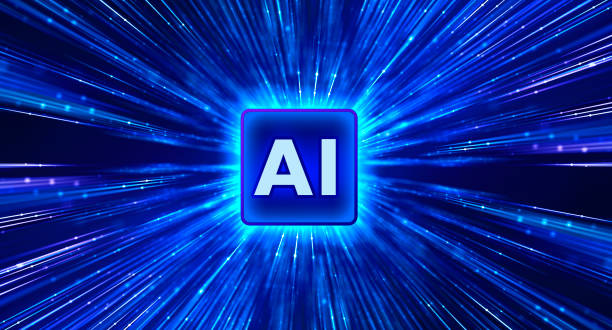
Jobs at risk and new jobs resulting from artificial intelligence
Some jobs are more at risk of being replaced by artificial intelligence than others.
Jobs that involve repetitive, routine, and automatable tasks fall into this category.
For example, telephone operators, office workers, taxi and truck drivers, and production line workers are among the jobs that are likely to be affected by #automation.
The future career of artificial intelligence for these people requires learning new skills and adapting to new conditions.
On the other hand, artificial intelligence creates new job opportunities that did not exist before.
These jobs include AI specialists, machine learning engineers, data scientists, data analysts, cybersecurity specialists, and AI ethics specialists.
The demand for these specialists is increasing and is expected to continue to grow in the coming years.
The future career of artificial intelligence is very bright and promising for these specialists.
In addition, artificial intelligence can create new jobs in existing industries.
For example, artificial intelligence can be used to develop new products and services, improve process efficiency and effectiveness, and provide more personalized experiences to customers.
This can lead to the creation of new jobs in marketing, sales, customer service, and other fields.
As a result, the future career of artificial intelligence is a dynamic and changing landscape.
Workers must be prepared to learn new skills and adapt to changes in order to succeed in this new job market.
Governments and organizations should also develop programs to support affected workers and facilitate their transition to new jobs.
Skills required to succeed in the age of artificial intelligence
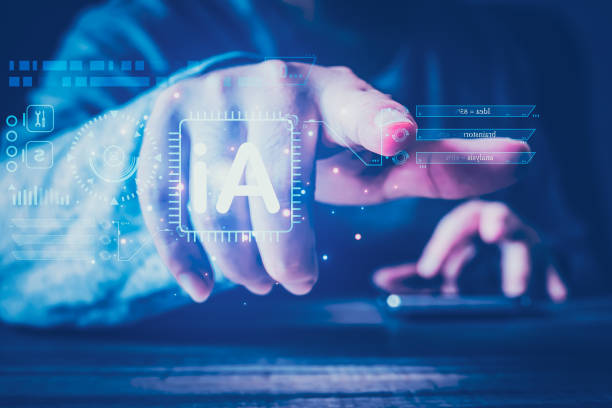
Skills required to succeed in the age of artificial intelligence
To succeed in the age of artificial intelligence, workers need to develop a range of technical and soft skills.
The future career of artificial intelligence will increasingly rely on the following skills:
- Technical skills include knowledge of programming, machine learning, data science, data analysis, and cybersecurity.
- Soft skills include critical thinking, problem-solving, creativity, communication, collaboration, and emotional intelligence.
In addition, workers must be able to learn continuously and adapt to changes.
Artificial intelligence is rapidly advancing, and workers must be able to learn new skills quickly and adapt to new technologies.
The table below shows some of the technical and soft skills required to succeed in the age of artificial intelligence:
| Skill | Description |
|---|---|
| Programming | Ability to write code to develop software and artificial intelligence systems. |
| Machine learning | Knowledge of machine learning algorithms and techniques. |
| Data science | Ability to collect, process, and analyze data. |
| Critical thinking | Ability to evaluate information and make logical decisions. |
| Problem-solving | Ability to identify and solve complex problems. |
Investing in education and development of these skills is crucial for the future career of artificial intelligence.
Individuals and organizations must strive to acquire and improve these skills to succeed in this changing world.
The role of education in preparing the workforce for artificial intelligence
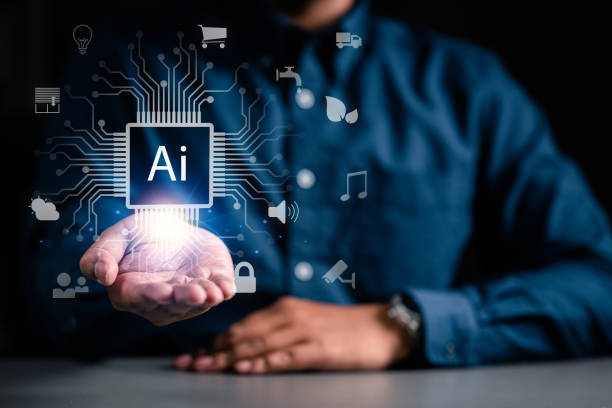
The role of education in preparing the workforce for artificial intelligence
The education system plays an important role in preparing the workforce for artificial intelligence.
Schools and universities should update their curricula to familiarize students with the skills needed to succeed in the age of artificial intelligence.
The future career of artificial intelligence requires a change in educational approaches.
Education should focus on developing critical thinking, problem-solving, creativity, and communication skills.
In addition, education should provide opportunities for students to work with artificial intelligence technologies and participate in practical projects related to artificial intelligence.
Also, education should be accessible to everyone, regardless of their socio-economic background.
Governments and organizations should develop programs to provide free or low-cost training in areas related to artificial intelligence to affected workers and low-income individuals.
The future career of artificial intelligence should not be exclusive to privileged individuals.
In addition, lifelong learning should be promoted.
Artificial intelligence is rapidly advancing, and workers must be able to learn new skills quickly and adapt to new technologies.
Providing online training courses and short-term workshops can help workers keep their skills up to date.
Does your current website create the trust that potential customers should have in your business? If the answer is no, it’s time to have a professional and impactful corporate website with Rasaweb.
✅ Completely custom design tailored to your brand identity
✅ Increased lead generation and credibility of your business in the eyes of customers⚡ Contact us for a free consultation!
The impact of artificial intelligence on various industries
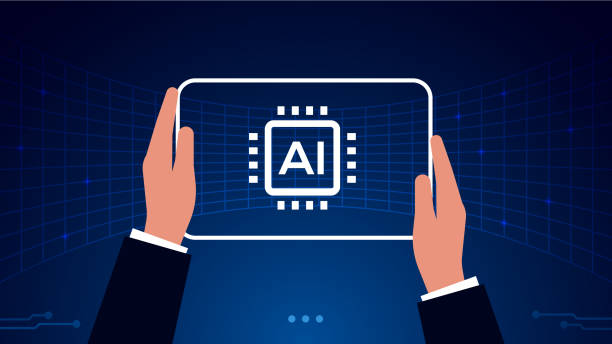
The impact of artificial intelligence on various industries
Artificial intelligence is already having a profound impact on various industries, and this impact is expected to increase in the coming years.
The future career of artificial intelligence is different in each industry, but in all cases, adapting to change is essential.
- In the healthcare industry, artificial intelligence is used to diagnose diseases, develop new drugs, provide personalized care, and improve operational efficiency.
- In the financial industry, artificial intelligence is used to detect fraud, manage risk, provide personalized financial services, and improve operational efficiency.
- In the manufacturing industry, artificial intelligence is used to automate production processes, improve product quality, reduce costs, and predict equipment failure.
- In the transportation industry, artificial intelligence is used to develop self-driving cars, improve traffic management, and provide more efficient logistics services.
These are just a few examples of how artificial intelligence is being used in various industries.
As technology advances, artificial intelligence is expected to be used in more industries and have a greater impact on the job market.
To better understand the impact of artificial intelligence on each industry, the future career of artificial intelligence requires careful analysis and review of existing trends.
Organizations must adjust their strategies accordingly, and workers must be prepared to acquire new skills.
Ethical and social challenges of artificial intelligence in the workplace
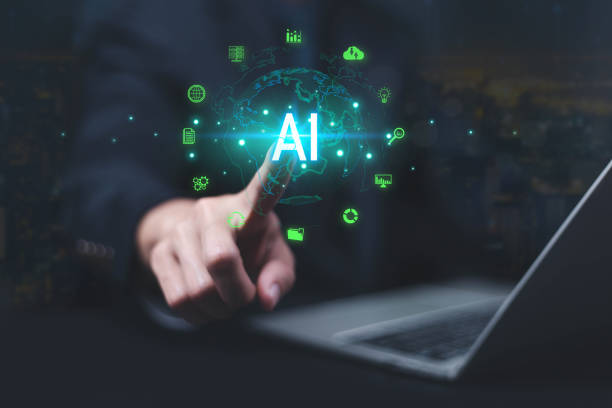
Ethical and social challenges of artificial intelligence in the workplace
The use of artificial intelligence in the workplace brings with it several ethical and social challenges.
These challenges include issues related to privacy, discrimination, accountability, and transparency.
The future career of artificial intelligence must be designed with these challenges in mind.
One of the main challenges is protecting the privacy of workers.
Artificial intelligence can be used to collect and analyze data about workers, which can lead to violations of privacy and discrimination.
For example, artificial intelligence can be used to monitor worker performance, assess their behavior, and make decisions about promotion or dismissal.
Another challenge is preventing discrimination.
Artificial intelligence algorithms can unintentionally be discriminatory and lead to unfair decisions.
For example, an AI algorithm used to select resumes may unintentionally reject resumes from women or minorities.
The future career of artificial intelligence should be designed in a way that prevents discrimination.
In addition, the issue of accountability is also raised.
If an artificial intelligence system makes a mistake, who will be responsible? Are the system developers, employers, or the system itself responsible? These questions do not yet have definitive answers and require further discussion and investigation.
To address these challenges, it is necessary to develop laws and regulations to regulate the use of artificial intelligence in the workplace.
These laws should protect the rights of workers, prevent discrimination, and ensure accountability.
Also, it is necessary to increase transparency about how artificial intelligence systems work so that workers can understand how these systems make decisions.
The future of artificial intelligence and its impact on future generations
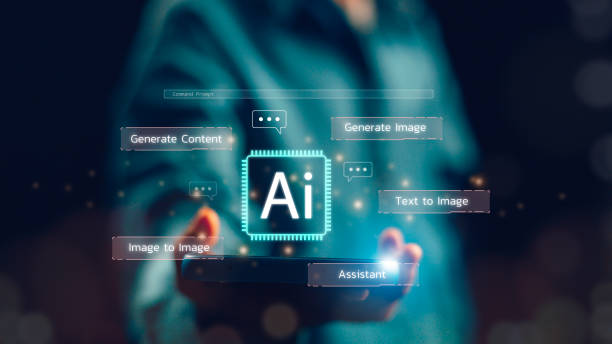
The future of artificial intelligence and its impact on future generations
Artificial intelligence is rapidly advancing and is expected to play a more important role in our lives in the future.
This technology can have a profound impact on future generations, both positive and negative.
The future career of artificial intelligence for future generations requires preparation and adaptation.
On the positive side, artificial intelligence can help solve major problems facing the world, such as climate change, diseases, and poverty.
Artificial intelligence can be used to develop renewable energy, diagnose diseases early, and provide personalized education.
Also, artificial intelligence can help increase productivity and create wealth, which can lead to improved living standards for all.
On the negative side, artificial intelligence can lead to job losses, increased inequality, and threats to privacy.
If artificial intelligence is not managed properly, it can lead to the creation of a polarized society in which a few people benefit from artificial intelligence and the majority are deprived of it.
The future career of artificial intelligence should be designed with these risks in mind.
The table below shows some of the advantages and disadvantages of artificial intelligence for future generations:
| Advantages | Disadvantages |
|---|---|
| Solving global problems | Job loss |
| Increasing productivity | Increased inequality |
| Improving living standards | Threat to privacy |
To ensure that artificial intelligence benefits everyone in the future career of artificial intelligence, action needs to be taken now.
These actions include investing in education, developing appropriate laws and regulations, and promoting the ethics of artificial intelligence.
Also, it is necessary to encourage discussion and dialogue on issues related to artificial intelligence so that everyone can participate in decision-making about the future of this technology.
Solutions for adapting to changes caused by artificial intelligence
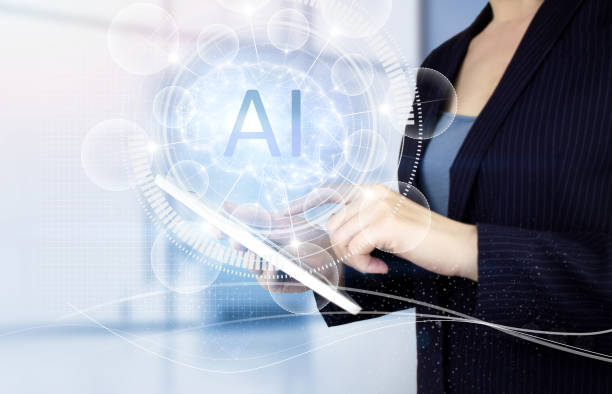
Solutions for adapting to changes caused by artificial intelligence
To adapt to the changes caused by artificial intelligence, individuals and organizations need to take a proactive and strategic approach.
This approach includes the following:
- Continuous learning Workers need to continuously learn new skills and adapt to new technologies.
- Developing soft skills Workers need to develop critical thinking, problem-solving, creativity, and communication skills.
- Changing jobs Workers whose jobs are at risk of being replaced by artificial intelligence should look for new jobs that are in higher demand.
- Investing in education Governments and organizations need to invest in education to prepare the workforce for the future career of artificial intelligence.
- Developing laws and regulations Governments need to develop laws and regulations to regulate the use of artificial intelligence in the workplace to protect the rights of workers.
- Promoting the ethics of artificial intelligence Organizations need to promote the ethics of artificial intelligence to ensure the responsible use of this technology.
By taking these steps, individuals and organizations can adapt to the changes caused by artificial intelligence and benefit from the advantages of this technology.
The future career of artificial intelligence requires cooperation and joint efforts of all stakeholders.
In short, to adapt to the future career of artificial intelligence, learning, adaptability, and readiness for change are essential.
Investing in new skills and knowledge, along with a deep understanding of the challenges and opportunities ahead, can help individuals and organizations succeed in this changing world.
Are you disappointed with the low conversion rate of your online store? Rasaweb turns your online store into a powerful tool for attracting and converting customers!
✅ Significant increase in visitor-to-buyer conversion rate
✅ Unique user experience to increase customer satisfaction and loyalty⚡ Get a free consultation from Rasaweb!
The role of governments in supporting the workforce against the impacts of artificial intelligence

The role of governments in supporting the workforce against the impacts of artificial intelligence
Governments have a very important role to play in supporting the workforce against the impacts of artificial intelligence.
This role includes the following:
- Investing in education Governments need to invest in education to prepare the workforce for the future career of artificial intelligence.
This investment should include technical and vocational training, lifelong learning, and training related to soft skills. - Creating social safety nets Governments need to create social safety nets to support workers who lose their jobs.
These nets should include unemployment insurance, retraining programs, and financial assistance. - Developing laws and regulations Governments need to develop laws and regulations to regulate the use of artificial intelligence in the workplace to protect the rights of workers.
These laws should include regulations regarding privacy, discrimination, and accountability. - Promoting the ethics of artificial intelligence Governments need to promote the ethics of artificial intelligence to ensure the responsible use of this technology.
This promotion should include education, awareness-raising, and encouragement of the development of ethical artificial intelligence systems.
By taking these steps, governments can help reduce the negative impacts of artificial intelligence on the workforce and benefit from the advantages of this technology for everyone.
The future career of artificial intelligence requires smart and supportive government policies.
Finally, governments should play a leadership role in shaping the future career of artificial intelligence.
This includes creating a suitable legal and regulatory environment, encouraging innovation and investment in artificial intelligence, and ensuring fair access to new job opportunities.
Future outlook for the future career of artificial intelligence
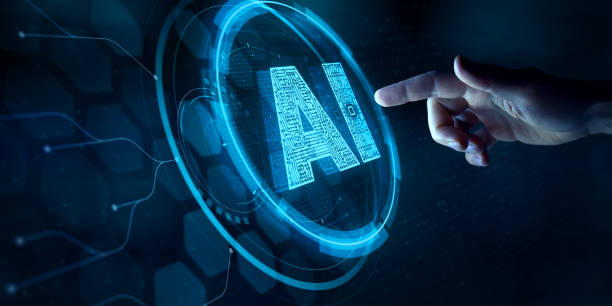
Future outlook for the future career of artificial intelligence
The future career of artificial intelligence is a dynamic and changing landscape.
As technology advances, artificial intelligence will be increasingly used in various industries and will have a profound impact on the job market.
The future career of artificial intelligence is threatening for some jobs, but it creates new opportunities for many others.
It is predicted that in the coming years, the demand for AI specialists, machine learning engineers, data scientists, and data analysts will increase sharply.
These specialists will play an important role in the development and implementation of AI systems and will help organizations benefit from this technology.
In addition, artificial intelligence can create new jobs in existing industries.
For example, artificial intelligence can be used to develop new products and services, improve process efficiency and effectiveness, and provide more personalized experiences to customers.
This can lead to the creation of new jobs in marketing, sales, customer service, and other fields.
The future career of artificial intelligence can be very diverse and broad.
However, it is important to pay attention to the ethical and social challenges of artificial intelligence as well.
The use of artificial intelligence in the workplace can lead to issues related to privacy, discrimination, accountability, and transparency.
To address these challenges, it is necessary to develop laws and regulations to regulate the use of artificial intelligence in the workplace.
The future career of artificial intelligence should be designed with these ethical issues in mind.
Finally, the future career of artificial intelligence depends on how we use this technology.
If we use artificial intelligence responsibly and ethically, we can benefit from its advantages to improve the lives of everyone.
If we use artificial intelligence improperly, we may face serious problems.
Therefore, it is essential to encourage discussion and dialogue on issues related to artificial intelligence so that everyone can participate in decision-making about the future of this technology.
Frequently Asked Questions
| Question | Answer |
|---|---|
| What impact will artificial intelligence have on the future job market? | Artificial intelligence automates repetitive jobs, but at the same time, it will create new and more complex jobs in areas such as development, maintenance, and training of artificial intelligence systems. |
| Which jobs are most at risk of being replaced by artificial intelligence? | Jobs that involve repetitive, rule-based tasks with little need for creativity or emotional intelligence, such as some manufacturing, data entry, and simple customer service jobs, are most at risk. |
| What skills are essential for success in a future career with artificial intelligence? | Skills such as critical thinking, complex problem solving, creativity, emotional intelligence, data literacy, the ability to work with artificial intelligence, and lifelong learning are of high importance. |
| Will artificial intelligence cause widespread unemployment? | Some jobs will disappear, but history has shown that new technologies, instead of widespread unemployment, change the shape of the job market and create new jobs. The need for adaptation and retraining is important. |
| What new job opportunities arise with the emergence of artificial intelligence? | Jobs such as machine learning engineer, data scientist, AI ethicist, Human-AI Interaction Designer, and digital transformation consultant are among the new opportunities. |
| What is the role of education in preparing for the future career with artificial intelligence? | Education should focus on developing soft skills, computational thinking, digital literacy, and the ability to learn continuously to prepare individuals for future changes. |
| How can I prepare myself for the labor market changes caused by artificial intelligence? | You can prepare yourself by learning new skills related to artificial intelligence and data, strengthening soft skills, developing critical thinking and creativity, and getting into the habit of lifelong learning. |
| Will AI ethics become an important career field? | Yes, given the growing concerns about biases, privacy, and automated decision-making of artificial intelligence, the role of AI ethics experts will be crucial to ensure its responsible development. |
| How important is human-AI collaboration in the future career? | Human-AI collaboration, rather than competition, shapes the future of the labor market. Artificial intelligence can be a tool to increase productivity and focus human efforts on more complex and creative tasks. |
| Which industries will be most affected by artificial intelligence? | Almost all industries will be affected, but areas such as healthcare, finance, transportation, manufacturing, education, and customer service are pioneers in adopting and transforming through artificial intelligence. |
And other services of Rasa Web advertising agency in the field of advertising
Intelligent digital advertising: Transform campaign management with key page optimization.
Intelligent brand identity: Professional optimization for customer behavior analysis using SEO-driven content strategy.
Intelligent Marketplace: An effective tool to increase sales by using real data.
Intelligent Linking: An effective tool for managing campaigns with SEO-driven content strategy.
Intelligent advertising campaign: An effective tool for online growth with intelligent data analysis.
And more than hundreds of other services in the field of internet advertising, advertising consulting and organizational solutions
Internet Advertising | Advertising Strategy | Advertorial
Resources
What is artificial intelligence and how does it work?
,What is artificial intelligence? Its features and applications
,The role of artificial intelligence in the job market and future career
,Artificial intelligence
? To achieve your big business goals in the digital world, Rasaweb Afarin Digital Marketing Agency is with you with a professional and result-oriented approach. From personal website design to comprehensive SEO and content marketing strategies, we provide everything you need to be seen and grow.
📍 Tehran, Mirdamad Street, next to the Central Bank, South Kazerun Alley, Ramin Alley No. 6

